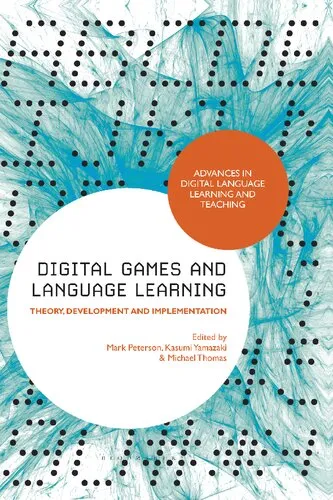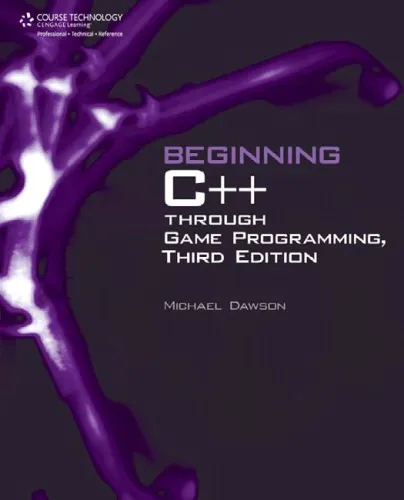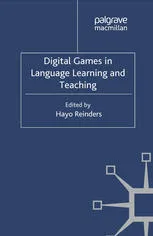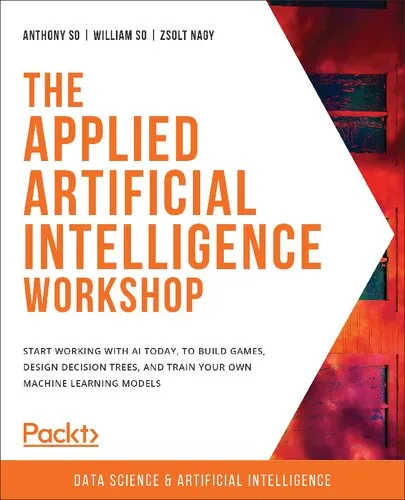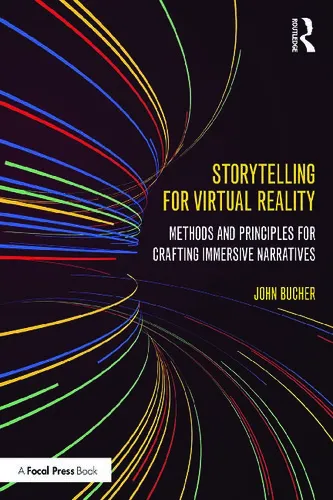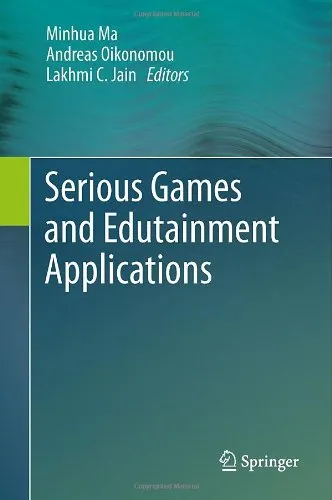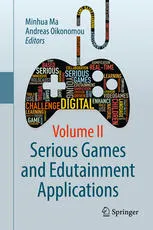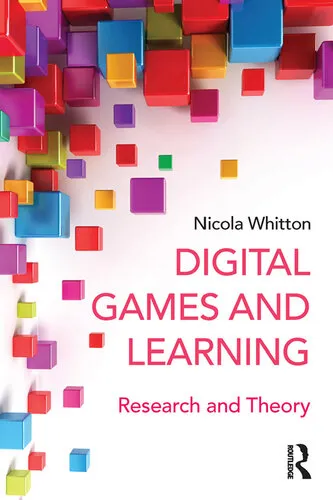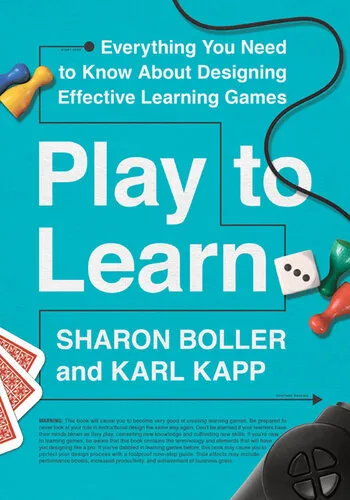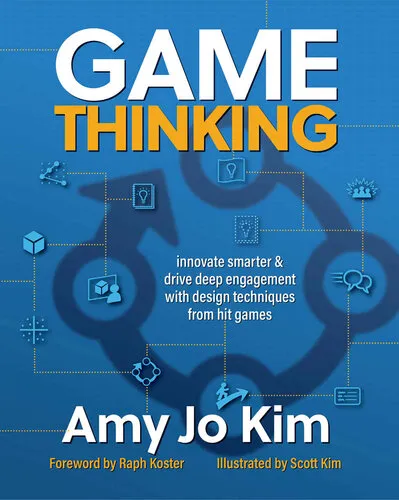Digital Games and Language Learning: Theory, Development and Implementation
4.0
بر اساس نظر کاربران

شما میتونید سوالاتتون در باره کتاب رو از هوش مصنوعیش بعد از ورود بپرسید
هر دانلود یا پرسش از هوش مصنوعی 2 امتیاز لازم دارد، برای بدست آوردن امتیاز رایگان، به صفحه ی راهنمای امتیازات سر بزنید و یک سری کار ارزشمند انجام بدینکتاب های مرتبط:
معرفی کتاب
کتاب Digital Games and Language Learning: Theory, Development and Implementation یکی از منابع برجسته و جامع در زمینه یادگیری زبان از طریق بازیهای دیجیتالی است. این کتاب توسط سه ویراستار مطرح، Mark Peterson، Kasumi Yamazaki و Michael Thomas گردآوری و ویراسته شده است. این اثر کاربردی و نظری، با هدف بررسی عمق ارتباط میان بازیهای دیجیتال و آموزش زبان طراحی شده و شامل تحلیلهای دقیق، روشهای توسعه و پیادهسازی بازیها در چارچوب یادگیری زبان است.
خلاصهای جامع از کتاب
این کتاب به طور جامع به بررسی نظریات و پژوهشهایی میپردازد که نقش مهم بازیهای دیجیتال را در یادگیری زبان تبیین کردهاند. نویسندهها استدلال میکنند که بازیهای دیجیتال، به عنوان یک ابزار تعاملی، میتوانند محیطی جذاب و جالب برای یادگیری زبان فراهم کنند.
کتاب در سه بخش اصلی به موضوعات مختلف میپردازد. بخش اول بر نظریات بنیادی تمرکز دارد، جایی که مفاهیمی همچون تعامل اجتماعی، غوطهوری (Immersion) و نقش انگیزش بررسی میشوند. در بخش دوم، مراحل طراحی و توسعه بازیهای دیجیتال آموزشی برای زبان بررسی میشود. بخش سوم نیز به پیادهسازی و ارزیابی این بازیها در سناریوهای واقعی آموزشی اختصاص دارد.
از دیگر بخشهای برجسته کتاب میتوان به بررسی ابزارهایی مانند Gamification، بازیهای چندنفره آنلاین (MMORPGs) و نرمافزارهای شبیهسازی زبان اشاره کرد. همچنین روشهای مختلف ارزیابی تاثیر این ابزارها بر مهارتهای مختلف زبانی (مانند شنیداری، گفتاری، نوشتاری و درک مطلب) نیز معرفی شده است.
نکات کلیدی کتاب
- ارائه نظریههای پیشرفته در زمینه تأثیر بازیهای دیجیتال بر یادگیری زبان.
- روشهای عملی برای طراحی و توسعه بازیهای آموزشی.
- بررسی مدلهای روانشناسی یادگیری و تعامل در محیطهای مجازی.
- تجزیه و تحلیل مطالعات موردی موفق در استفاده از بازی برای آموزش زبان.
- راهنمایی برای ارزیابی اثربخشی ابزارها و تکنیکهای مبتنی بر بازی.
جملات معروف از کتاب
"Digital games are not just tools for fun; they represent a dynamic medium of learner engagement and language acquisition."
"The immersive nature of multiplayer environments creates unparalleled opportunities for authentic linguistic and cultural exchanges."
"Understanding how learners interact with game-based tasks is essential to designing effective educational solutions."
چرا این کتاب مهم است؟
اهمیت این کتاب در پیشبرد مرزهای دانش یادگیری زبان و فناوریهای آموزشی نهفته است. در دنیایی که فناوری هر روز پیشرفتهای تازهای دارد، بهرهگیری از بازیهای دیجیتال بهعنوان ابزاری برای یادگیری زبان، انقلابی در آموزش ایجاد کرده است. این کتاب برای پژوهشگران، معلمان زبان، طراحان بازی و دانشجویانی که به دنبال درک عمیقتر ارتباط میان فناوری و آموزش هستند، مرجع ارزشمندی محسوب میشود.
با ارائه مطالعات موردی واقعی و کاربردی، این اثر به خوانندگان فرصت میدهد تا ابزارها و تکنیکهای جدید را در محیطهای آموزشی خود به کار گیرند و همچنین از پیشرفتهای جاری در این حوزه آگاهی پیدا کنند. افزون بر این، اهمیت این کتاب در رویکرد میانرشتهای آن برای ترکیب نظریه، طراحی و ارزیابی است که در پژوهشهای آکادمیک و عملی به شکل تاثیرگذاری انعکاس یافته است.
Introduction to Digital Games and Language Learning: Theory, Development and Implementation
"Digital Games and Language Learning: Theory, Development and Implementation" is a comprehensive academic work that delves into the multifaceted relationship between digital gaming and language education. Developed by editors Mark Peterson, Kasumi Yamazaki, and Michael Thomas, this book sheds light on the pedagogical potential of digital games as innovative tools for language acquisition. By combining theoretical frameworks, empirical studies, and practical applications, the book aims to bridge the gaps between the fields of game-based learning and second language acquisition.
Detailed Summary
The book is divided into several chapters, each carefully crafted to examine a specific aspect of digital game-based language learning (DGBLL). It provides a deep exploration of the theoretical underpinnings of DGBLL, blending insights from linguistics, psychology, and educational technology. By weaving together research findings and hands-on implementation strategies, this book empowers educators, game developers, and researchers to understand how digital games can enhance linguistic competencies such as vocabulary acquisition, speaking, listening, reading, and writing.
Additionally, the book addresses the development of learner autonomy, motivation, and engagement through the lens of game-based experiences. It critically evaluates various types of games—ranging from commercial off-the-shelf (COTS) games to serious educational games—and their potential to foster multilingual and multicultural communication. With actionable recommendations, the authors encourage the design and implementation of effective game-based learning environments tailored to diverse language learners.
Key Takeaways
- Understanding the theoretical foundations of digital games in language education.
- Insights into how games can develop linguistic and intercultural competencies.
- Practical strategies for integrating digital games into language classrooms.
- Exploration of real-world case studies showcasing successful DGBLL applications.
- Evaluation of the challenges and limitations of adopting game-based learning in different contexts.
Famous Quotes from the Book
"Digital games are not merely entertainment; they are immersive environments that can facilitate authentic, meaningful, and rich language learning experiences."
"By engaging players in problem-solving, decision-making, and interaction, digital games create fertile ground for practicing real-world communication skills."
"The challenge for educators is not whether digital games belong in education, but rather how to effectively harness their potential for meaningful learning."
Why This Book Matters
In an age where digital transformation is reshaping education, "Digital Games and Language Learning" serves as a critical resource for professionals and academics looking to innovate teaching methodologies. By focusing on the convergence of gaming and pedagogy, this book challenges traditional perspectives on language learning and introduces dynamic ways to engage learners in today's digital age. It matters because it resonates with 21st-century learners, who are increasingly immersed in interactive multimedia environments.
Furthermore, this book is a trailblazer in addressing the practical concerns of integrating digital games into educational systems. With its holistic approach, it inspires educators to embrace emerging technologies while providing the necessary tools to make informed decisions. For researchers, it offers a robust foundation to further explore this growing subfield of applied linguistics and educational technology.
Ultimately, "Digital Games and Language Learning" matters because it aligns with global efforts to transform how education is delivered, making it more engaging, inclusive, and effective for learners worldwide.
This introduction highlights the significance of "Digital Games and Language Learning: Theory, Development and Implementation" in advancing our understanding of digital game-based language education. By unlocking the potential of games, this work contributes to the evolution of teaching practices, the enhancement of learner experiences, and the growth of interdisciplinary research.
دانلود رایگان مستقیم
شما میتونید سوالاتتون در باره کتاب رو از هوش مصنوعیش بعد از ورود بپرسید
دسترسی به کتابها از طریق پلتفرمهای قانونی و کتابخانههای عمومی نه تنها از حقوق نویسندگان و ناشران حمایت میکند، بلکه به پایداری فرهنگ کتابخوانی نیز کمک میرساند. پیش از دانلود، لحظهای به بررسی این گزینهها فکر کنید.
این کتاب رو در پلتفرم های دیگه ببینید
WorldCat به شما کمک میکنه تا کتاب ها رو در کتابخانه های سراسر دنیا پیدا کنید
امتیازها، نظرات تخصصی و صحبت ها درباره کتاب را در Goodreads ببینید
کتابهای کمیاب یا دست دوم را در AbeBooks پیدا کنید و بخرید
1347
بازدید4.0
امتیاز0
نظر98%
رضایتنظرات:
4.0
بر اساس 0 نظر کاربران
Questions & Answers
Ask questions about this book or help others by answering
No questions yet. Be the first to ask!
